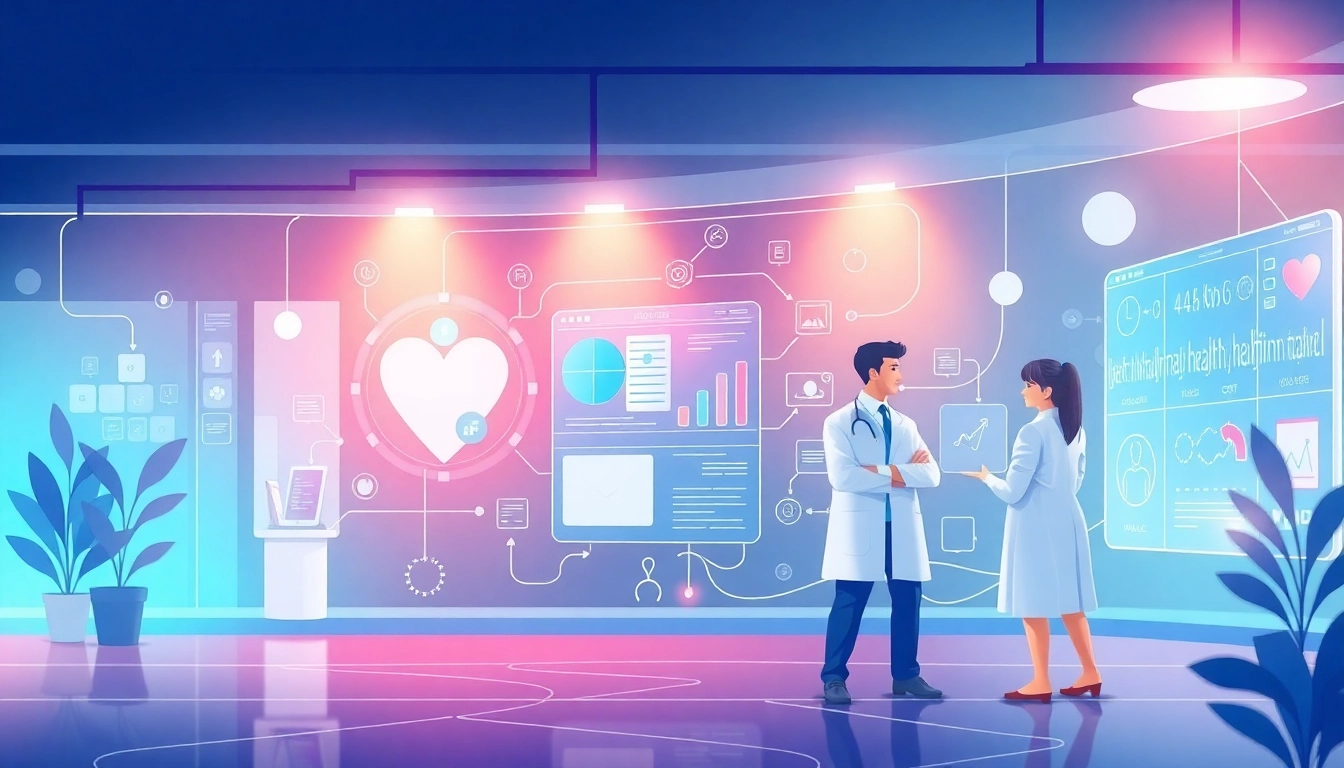Understanding the Role of Informatics in Healthcare
In the rapidly evolving landscape of healthcare, the significance of informatics has taken center stage. By leveraging data, information, and knowledge, healthcare informatics aims to enhance patient outcomes, streamline healthcare processes, and transform the delivery of care. The use of informatics is not limited to data management; it encompasses the entire ecosystem of healthcare, affecting how clinicians, administrators, and researchers interact with information. For a comprehensive dive into this crucial subject, check out https://www.informaticsview.com. In this article, we will explore the definition, components, evolution, benefits, challenges, best practices, and future trends of informatics in healthcare.
Defining Health Informatics
Health informatics is a multidisciplinary field that combines principles from computer science, information science, and healthcare to manage and analyze health data. As defined by the American Medical Informatics Association (AMIA), health informatics is the science of how to use data, information, and knowledge to improve human health and the delivery of healthcare services. This field encompasses various domains, including clinical informatics, bioinformatics, public health informatics, and consumer health informatics.
At its core, health informatics aims to leverage health data to facilitate better decision-making and improve patient care. It’s about applying technological tools to analyze and interpret vast amounts of data—transforming raw data into actionable insights that healthcare professionals can utilize.
Key Components of Healthcare Informatics
The architecture of healthcare informatics is built on several key components:
- Data Integration: Aggregating data from various healthcare systems and sources, such as electronic health records (EHRs), laboratory systems, and billing systems.
- Data Management: Organizing and storing healthcare data efficiently, ensuring that it is accessible and secure.
- Analysis Tools: Using analytical tools and algorithms to interpret data, identify patterns, and support clinical decisions.
- Clinical Decision Support Systems (CDSS): Providing healthcare professionals with tools to assist in clinical decision-making by integrating patient data with clinical guidelines.
- Health Information Exchange (HIE): Facilitating the electronic movement of health information across organizations while maintaining the privacy and security of patient data.
The Evolution of Informatic Practices
The journey of health informatics has seen significant milestones. Initially, the focus was primarily on the digitization of medical records. Over the years, advancements in technology have led to the creation of interoperable systems that allow for real-time data access and sharing among healthcare providers. The introduction of EHRs marked a pivotal moment, transforming how patient information is documented, stored, and accessed.
More recently, the rise of artificial intelligence, data analytics, and machine learning in healthcare has opened new avenues for informatics applications. By implementing these technologies, healthcare organizations can improve diagnosis accuracy, personalize treatment plans, and predict healthcare trends. The evolution of practices in health informatics now emphasizes a more integrated approach, focusing on value-based care and patient-centered solutions.
Benefits of Informatics in Clinical Settings
Informatics has proven to be indispensable in clinical settings, yielding numerous advantages that enhance the quality of care and operational efficiency.
Improving Patient Care Quality
The primary objective of healthcare informatics is to improve patient care quality. By employing data-driven methodologies, healthcare professionals can make informed decisions. For instance, clinical decision support systems play a crucial role by providing evidence-based recommendations tailored to individual patient needs. Such systems not only help in diagnosing conditions more accurately but also minimize medication errors, ultimately leading to better patient outcomes and satisfaction.
Streamlining Healthcare Operations
Informatics significantly optimizes healthcare operations by automating administrative tasks such as scheduling, billing, and claims processing. This streamlining reduces administrative burdens on healthcare professionals, allowing them to dedicate more time to patient care. Furthermore, data analytics enables organizations to identify inefficiencies and optimize resource allocation, reducing operational costs while improving service delivery.
Enhancing Data Management and Security
With the increasing digitization of health data, robust data management and security protocols are more critical than ever. Healthcare informatics mandates secure techniques for data storage and sharing, ensuring patient privacy and compliance with regulations such as HIPAA. Effective informatics strategies establish strict access controls, encryption, and auditing procedures to protect sensitive information from unauthorized access or breaches, thereby fostering patient trust.
Challenges Facing Healthcare Informatics
Despite the myriad benefits associated with healthcare informatics, organizations face several significant challenges that can impede successful implementation.
Integration of New Technologies
The integration of new technologies into existing healthcare infrastructure is a complex task fraught with challenges. Many organizations struggle with system interoperability, where disparate systems do not communicate efficiently, leading to data silos. Effective integration requires careful planning and execution, alongside continual evaluation to ensure systems operate cohesively. Moreover, the rapid pace of technological advancement means that healthcare professionals must be adaptable and well-trained in new tools and applications.
Data Privacy and Compliance Issues
As healthcare organizations increasingly depend on technology for data management, safeguarding patient information has become a paramount concern. Organizations must ensure compliance with frameworks like HIPAA and GDPR, requiring stringent data governance policies and practices. Non-compliance can result in heavy financial penalties and damage to an organization’s reputation, necessitating proactive strategies to mitigate security risks.
Managing User Adoption and Resistance
Implementing informatics solutions often encounters resistance from users accustomed to traditional workflows. Successfully managing this change involves developing a strong change management strategy, fostering an inclusive environment where staff feels supported, and providing comprehensive training to build proficiency. Engaging end-users early in the process ensures that the systems put in place are user-friendly and aligned with their workflows, increasing adoption rates and effectiveness.
Best Practices for Implementing Informatics Solutions
To maximize the benefits of healthcare informatics and combat potential challenges, organizations should adhere to a set of best practices when implementing informatics solutions.
Developing an Effective Informatics Strategy
A well-crafted informatics strategy is foundational. Organizations should conduct a thorough needs assessment to identify priority areas for informatics investments. Key stakeholders, including clinicians, IT professionals, and administrative staff, should collaborate to draft a roadmap that aligns with organizational goals and patient care objectives. This holistic approach fosters buy-in and ensures that the technology supports clinical workflows.
Engaging Stakeholders Across Departments
Informatics implementation is rarely the responsibility of a single department. Engaging stakeholders from various departments—including clinical, administrative, and IT—is critical to fostering a culture of collaboration and ownership. Regular interdisciplinary meetings can facilitate communication, ensuring that each stakeholder’s perspective is valued and addressed. This alignment promotes a more seamless integration of informatics solutions across the organization.
Continuous Training and Support for Staff
Providing continuous training and support is vital for successful informatics adoption. Organizations should offer ongoing education and resources to keep staff updated on new systems and practices. Cultivating a culture of continuous learning helps professionals feel empowered and capable of using new technologies effectively. Moreover, ready access to support resources can mitigate frustration and enhance user experience.
Future Trends in Health Informatics
The future of health informatics is bright, with several key trends poised to reshape the landscape.
Artificial Intelligence and Machine Learning Applications
As AI and machine learning technologies advance, their applications in health informatics will expand dramatically. From predictive analytics that can forecast patient outcomes to natural language processing tools that help analyze unstructured clinical notes, these technologies promise to enhance decision-making and personalize patient care. AI-driven tools have the potential to alleviate clinician workloads by automating administrative tasks and offering insights based on vast data sets.
Telehealth and Remote Monitoring Solutions
The COVID-19 pandemic brought telehealth to the forefront, demonstrating its value in maintaining the continuity of care. The future will likely see a continued emphasis on remote monitoring solutions, enabling patients to receive care from the comfort of their homes. Advanced informatics systems will be necessary to facilitate effective virtual consultations and monitor patient outcomes remotely, paving the way for more patient-centered care models.
Personalized Medicine and Data Analytics
The integration of big data analytics into healthcare informatics is set to revolutionize personalized medicine. By analyzing genetic, lifestyle, and environmental data, healthcare providers can develop tailored treatment protocols that cater to individual patient needs. This move towards personalized care will not only improve efficacy but also enhance patient engagement and adherence to treatment plans.



